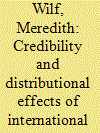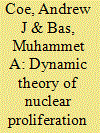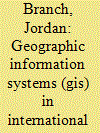|
|
|
Sort Order |
|
|
|
Items / Page
|
|
|
|
|
|
|
| Srl | Item |
| 1 |
ID:
149132


|
|
|
|
|
| Summary/Abstract |
Who supports multilateral treaties and who does not? We offer a systematic account of treaty ratification patterns paying particular attention to different states' roles in international legal cooperation in relation to the United States' ratification behavior. States' ability to influence the terms of treaties and their acceptance increases their incentives for treaty ratification. Multilateral powers—states that are powerful and independent from the United States—support multilateral legal cooperation because it offers them an opportunity to shape treaty content. Their engagement in multilateral treaties is strongest when the United States does not lead. States that are weak and/or dependent cannot greatly affect treaties and are therefore less supportive of them but are subject to US pressure. An empirical analysis of states' decisions to ratify prominent postwar multilateral treaties covering a wide range of global issues supports our argument.
|
|
|
|
|
|
|
|
|
|
|
|
|
|
|
|
| 2 |
ID:
149130


|
|
|
|
|
| Summary/Abstract |
Financial regulatory networks are a pervasive new type of global governance heralded by some as a flexible answer to globalization dilemmas and dismissed by others as ineffective because of weak enforcement mechanisms. Whether regulatory network agreements provide global public goods or private goods for certain states’ firms is a second debated issue. This article adjudicates among competing perspectives by examining whether Basel III, an international agreement about bank capital minimums negotiated by the bank regulatory network in 2009 and 2010, was viewed as credible and affecting regulated US firms. I use stock returns to measure investors’ perceptions, and an event study methodology to test whether regulated banks’ observed stock returns significantly differ from expected stock returns on days when new information about Basel III becomes available. If the agreement is viewed as credible and affecting firm value, banks’ stock returns will deviate from expectations. The direction of any deviation indicates whether regulations benefit or hurt banks. Although the direction of effects is not uniform across events, I find that the initial stock return reaction and the net effect across all five events are negative, and of a similar magnitude as regulated foreign banks, indicating that US banks were harmed, and did not benefit from, the new international regulations. US banks experienced stock returns that differed from expectations, providing evidence that international regulatory network agreements are viewed as credible and tangibly affect firms independent of domestic implementation.
|
|
|
|
|
|
|
|
|
|
|
|
|
|
|
|
| 3 |
ID:
149128


|
|
|
|
|
| Summary/Abstract |
Scholars, observing clustering in transitions to democracy, argue that democratization diffuses across borders as citizens in autocracies demand the same reforms they witness in neighboring states. We disagree. This article demonstrates that diffusion plays only a highly conditional role in democratization. We advance and test an alternative two-step theory of clustered democratization: (1) economic and international political shocks, which are clustered spatially and temporally, induce the breakdown of authoritarian regimes; then (2) democratic diffusion, in turn, influences whether a fallen dictatorship will be replaced by a democracy or a new autocracy. Diffusion, despite playing an important role, is insufficient to explain the clustering of transitions. Using data on 125 autocracies from 1875 to 2004, we show that economic crises trigger authoritarian breakdowns, while diffusion influences whether the new regime is democratic or authoritarian.
|
|
|
|
|
|
|
|
|
|
|
|
|
|
|
|
| 4 |
ID:
149127


|
|
|
|
|
| Summary/Abstract |
We develop a formal model of bargaining between two states where one can invest in a program to develop nuclear weapons and the other imperfectly observes its efforts and progress over time. In the absence of a nonproliferation deal, the observing state watches the former's program, waiting until proliferation seems imminent to attack. Chance elements—when the program will make progress and when the other state will discover this—determine outcomes. Surprise proliferation, crises over the suspected progress of a nuclear program, and possibly “mistaken” preventive wars arise endogenously from these chance elements. Consistent with the model's predictions and contrary to previous studies, the empirical evidence shows that the progress of a nuclear program and intelligence estimates of it explain the character and outcomes of most interactions between a proliferant and a potential preventive attacker. Counterintuitively, policies intended to reduce proliferation by delaying nuclear programs or improving monitoring capabilities may instead encourage it.
|
|
|
|
|
|
|
|
|
|
|
|
|
|
|
|
| 5 |
ID:
149133


|
|
|
|
|
| Summary/Abstract |
Geographic Information Systems (GIS) are being applied with increasing frequency, and with increasing sophistication, in international relations and in political science more generally. Their benefits have been impressive: analyses that simply would not have been possible without GIS are now being completed, and the spatial component of international politics—long considered central but rarely incorporated analytically—has been given new emphasis. However, new methods face new challenges, and to apply GIS successfully, two specific issues need to be addressed: measurement validity and selection bias. Both relate to the challenge of conceptualizing nonspatial phenomena with the spatial tools of GIS. Significant measurement error can occur when the concepts that are coded as spatial variables are not, in fact, validly measured by the default data structure of GIS, and selection bias can arise when GIS systematically excludes certain types of units. Because these potential problems are hidden by the technical details of the method, GIS data sets and analyses can sometimes appear to overcome these challenges when, in fact, they fail to do so. Once these issues come to light, however, potential solutions become apparent—including some in existing applications in international relations and in other fields.
|
|
|
|
|
|
|
|
|
|
|
|
|
|
|
|
| 6 |
ID:
149131


|
|
|
|
|
| Summary/Abstract |
Why and when do developing countries file trade disputes at the World Trade Organization (WTO)? Although financial conditions have long been considered an important driver of trade policy, they have been largely absent from the literature on trade disputes. We argue that developing country governments bring more trade dispute to the WTO when overvalued real exchange rates put exporters at a competitive disadvantage. This dynamic is most prevalent in countries where large foreign currency debt burdens discourage nominal currency devaluations that would otherwise serve exporters’ interests. Our findings provide an explanation for differences in dispute participation rates among developing countries, and also suggest a new link between exchange rate regimes and trade policy.
|
|
|
|
|
|
|
|
|
|
|
|
|
|
|
|
| 7 |
ID:
149129


|
|
|
|
|
| Summary/Abstract |
A broad literature on how oil wealth affects civil war onset argues that oil production engenders violent contests to capture a valuable prize from vulnerable governments. By contrast, research linking oil wealth to durable authoritarian regimes argues that oil-rich governments deter societal challenges by strategically allocating enormous revenues to enhance military capacity and to provide patronage. This article presents a unified formal model that evaluates how these competing mechanisms affect overall incentives for center-seeking civil wars. The model yields two key implications. First, large oil-generated revenues strengthen the government and exert an overall effect that decreases center-seeking civil war propensity. Second, oil revenues are less effective at preventing center-seeking civil war relative to other revenue sources, which distinguishes overall and relative effects. Revised statistical results test overall rather than relative effects by omitting the conventional but posttreatment covariate of income per capita, and demonstrate a consistent negative association between oil wealth and center-seeking civil war onset.
|
|
|
|
|
|
|
|
|
|
|
|
|
|
|
|
|
|
|
|
|